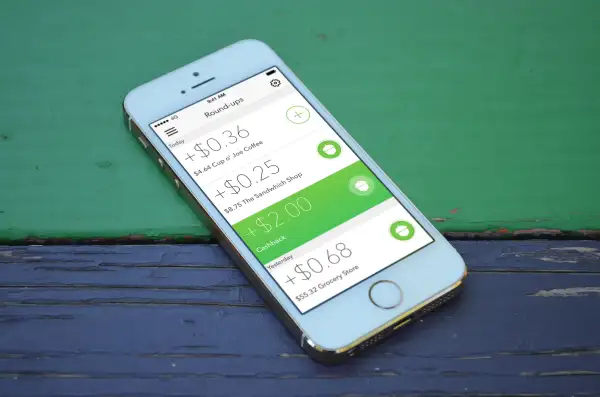This App May Let You Retire on Your Spare Change

Americans spend $11 trillion a year while saving very little. So it makes sense to link the two, as a number of financial companies have tried to do over the past decade. The latest is the startup Acorns, which hopes to hook millennials on the merits of mobile micro investing over many decades.
Through the Acorns app, released for iPhone this week, you sock away “spare change” every time you use your linked credit or debit card. The app rounds up purchases to the nearest dollar, takes the difference from your checking account, and plunks it in a solid, no-frills investment portfolio. So when you spend, say, $1.29 for a song on iTunes, the app reads that as $2 and pushes 71¢ into your Acorns account. With a swipe, you can also contribute small or large sums separate from any spending.
The Acorns portfolio is purposely simple: Your money gets spread among six basic index funds. The weighting in each fund depends on your risk profile, which you can dial up or down on your iPhone. More aggressive settings put more money in stocks. But you always have some money in each fund, remaining diversified among large and small company stocks, emerging markets, real estate, government and corporate bonds. The app will be available for Android in a few weeks and through a website in a few months.
Why Millennials Are the Target
Micro investing via a mobile device clearly targets millennials, who show great interest in saving but have been largely ignored by financial advisers and large banks. Young people may not have enough assets to meet the minimum requirements of big financial houses like Fidelity, Vanguard, and Schwab. With Acorns, there are no minimums. There are also none of the commissions that can render investing in small doses prohibitively expensive. “We want small investors who can grow with us over time,” says Acorns co-founder Jeff Cruttenden.
This approach places Acorns in the middle a rash of low-fee, online financial firms geared at young adults—including Square, Betterment, Robinhood, and Wealthfront. Such firms hope to capitalize on young adults’ penchant for tech solutions and lingering mistrust of large financial institutions. Cruttenden says a third of Acorns users are under age 22. They like to save in dribs and drabs—and manage everything from a mobile device.
Acorns charges a flat $1 monthly fee and between 0.25% and 0.5% of assets each year. The typical mutual fund has fees of 1% or more. Yet many index fund fees run lower. The Vanguard S&P 500 ETF, which invests in large company stocks, charges just 0.05%. If you have a few thousand dollars to open an account, and the discipline to invest a set amount each month, you might do better there. But remember that is just one fund. With Acorns you get diversification across six asset classes—along with the rounding up feature, which seems to have appeal.
Acorns has been testing the app all summer and says the average account holder contributes $7 a day through lump sums and a total of 500,000 round ups. Cruttenden says he is a typical user and through rounding up his card purchases has added $521.63 to his account over three months.
A New Twist on an Old Concept
Mortgage experts tout rounding up as a way to pay off your mortgage quicker. On a $200,000 loan at 4.5% for 30 years your payment would be $1,013.38. Rounding up to the nearest $100, or to $1,100, would cut your payoff time by 52 months and save you $26,821.20 in interest. Rounding up your card purchases works much the same way—only you are accumulating savings, not cutting your interest expense.
Bank of America offers a Keep the Change program, which rounds up debit-card purchases to the nearest buck and then pushes the difference into a savings account. Upromise offers credit card holders rewards that help pay for college. But Acorns’ approach is different: the money goes into an actual investment account with solid long-term growth potential.
One possible drawback is that this is a taxable account, which means you fund the Acorns account with after-tax money. Young adults starting a career with a company that offers a tax-deferred 401(k) plan with a match would be better served putting money in that account, if they must choose. But if you are like millions of people who throw spare change in a drawer anyway, Acorns is a way to do it electronically and let those nickels, dimes, and pennies go to work for you in a more meaningful way.
Read more on getting a jump on saving and investing:
- Ready to Start Saving? Do it Right
- The One Thing You Have to Know to Invest on Your Own
- Get the Most from Your 401(k) at Any Age
